Unlocking Your Brain's Potential: 4 Natural Ways to Boost Brain Health
Unlock your brain's potential and boost cognitive function the natural way. From brain exercises to foods, learn 4 easy ways to improve your brain...
Learn essential and evidence-based tips for keeping the brain healthy for life. Eating, sleeping & exercising have proven positive impacts on brain health.
Understanding and improving the brain’s health is the latest frontier in health science and wellness. In recent years there have been a lot of media reports about studies on sleep, brain training, head injuries and preventing cognitive decline. In this article we will look at some of the best ways to keep our brains healthy and create mental and emotional resilience.
Below we've listed the key tips as well as a few surprising tools to take care of our brain’s cognitive and emotional health. These first three tips below are key basic ways you can implement to improve your brain function naturally. Eating, sleeping, and exercising have proven positive impacts on our overall health and especially brain health. The last three tips are surprising tips research has found to improve your brain health.
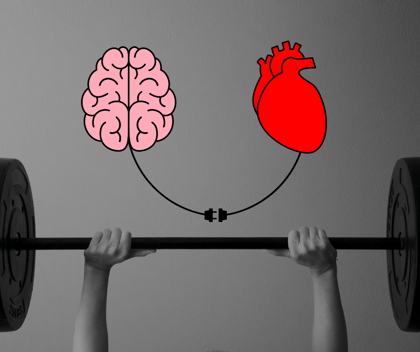 It’s all about the mind/body connection, as the popular saying goes. Physical exercise is key to maintaining your brain health. One reason is because exercising boosts blood flow to the brain. The Physical Activity and Brain Health Study conducted at the University of Palermo, Italy has shown the importance of physical activity on good brain health highlighting the fact that physical activity contributes to delaying the brain's aging and degenerative disease such as Alzheimer's and diabetes. Their research showed that it also improves cognitive abilities and memory.
It’s all about the mind/body connection, as the popular saying goes. Physical exercise is key to maintaining your brain health. One reason is because exercising boosts blood flow to the brain. The Physical Activity and Brain Health Study conducted at the University of Palermo, Italy has shown the importance of physical activity on good brain health highlighting the fact that physical activity contributes to delaying the brain's aging and degenerative disease such as Alzheimer's and diabetes. Their research showed that it also improves cognitive abilities and memory.
Building muscle is also key to brain health by way of improving heart-health. Numerous studies have shown that aerobic exercise combined with strength training is good for the heart's health. A healthier heart pumps blood more efficiently and effectively, therefore, providing better blood flow to the brain.
As the Technical University of Chemnitz Study analyzed, aerobic exercise will decrease your resting heart rate. Your resting heart rate or your pulse is the number of times your heart beats per minute when you are at rest, which indicates the heart is working more efficiently.
We hear all the time that exercising frequently is important for your health, but how much exercise is the right amount for brain health? According to Mayo Clinic, performing strength training exercises for all major muscle groups at least two times a week and make sure to get at least 150 minutes of moderate aerobic activity or 75 minutes of vigorous aerobic activity a week is a good amount.
When we exercise it's shown in research to have positive impact on the brain's health. For example, in a new study done at the University of British Columbia, researchers found that regular exercise changes the brain to improve memory, and thinking skills. Exercise is a way to sharpen your brain!
A simpler goal for brain health and longevity: walk vigorously (like you are in a hurry to catch a bus) 30 minutes a day. That's the recommendation by leading brain health psychiatrist, Dr Daniel Amen.

Research has proven over and over that having the right diet will improve your physical and cognitive performance. With a healthy diet, your mental health will be positively impacted. You can also lower your risk of many chronic diseases. For example, green, leafy vegetables, fatty fish, and berries are all brain foods since they are all foods linked to better brainpower. These foods can also preserve brain function and slow mental decline.
Other brain foods include coffee and dark chocolate. Your overall mood can be boosted by drinking coffee, that’s no surprise. But coffee also wards against Alzheimer’s. This is in part due to the caffeine and antioxidants found in coffee.
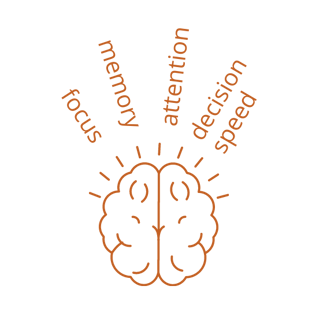 Foods high in vitamin C are also considered brain food. According to the Plasma Vitamin C Concentrations and Cognitive Function: A Cross-Sectional Study, having higher vitamin C levels in the blood were correlated with improvements in tasks better cognitive performance, including focus, attention and decision speed.
Foods high in vitamin C are also considered brain food. According to the Plasma Vitamin C Concentrations and Cognitive Function: A Cross-Sectional Study, having higher vitamin C levels in the blood were correlated with improvements in tasks better cognitive performance, including focus, attention and decision speed.
Vitamin C has been shown to be a powerful antioxidant that fights cell damage, including brain cells.
High quality eggs are also brain food. Eggs provide several B vitamins and choline. These are vital for regulating mood and promoting proper brain function and development. Also eating nuts can improve your heart and brain. Nuts include Vitamin E which protects cells against free-radical damage to help slow mental decline.
What Foods Are Good And Bad For the Brain?
 Some of us will miss out on getting proper sleep. But some of those bad habits can also take a toll on your brain. As will be further highlighted in health tip 5, not getting enough oxygen to the brain will negatively affect brain function. Dr Sharon Sha, MD, MS a Clinical Associate Professor of Neurology at Stanford University stated that another important factor in brain health is the amount of oxygen delivered to the brain. One condition that prevents good oxygen delivery is sleep apnea, where the airways are restricted and the individual stops breathing many times during the night.
Some of us will miss out on getting proper sleep. But some of those bad habits can also take a toll on your brain. As will be further highlighted in health tip 5, not getting enough oxygen to the brain will negatively affect brain function. Dr Sharon Sha, MD, MS a Clinical Associate Professor of Neurology at Stanford University stated that another important factor in brain health is the amount of oxygen delivered to the brain. One condition that prevents good oxygen delivery is sleep apnea, where the airways are restricted and the individual stops breathing many times during the night.
Dr Sharon Sha further referenced the National Institutes of Health Study that highlights that quality sleep leads to less build-up of the amyloid proteins associated with Alzheimer's disease, possibly because those proteins are flushed during sleep. Through studies like this one, researchers are coming to understand why poor sleep is connected to cognitive decline.
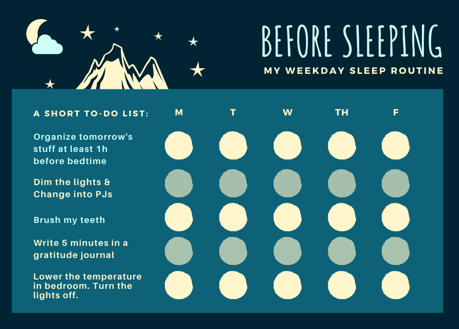 One reason we don't get enough sleep is staying up too late at night. For many people late at night is when they have alone time where they give themselves permission to do things they enjoy. This is especially true for parents of young children. Finding time earlier in the day or shortening the alone time activities is one way to get more sleep.
One reason we don't get enough sleep is staying up too late at night. For many people late at night is when they have alone time where they give themselves permission to do things they enjoy. This is especially true for parents of young children. Finding time earlier in the day or shortening the alone time activities is one way to get more sleep.
A second reason is that the brain is stimulated too close to bedtime by things like using smartphones in bed, or watching stimulating dramatic shows just before wanting to go to sleep. Limited stimulating activities to an hour prior to when you want to be asleep. Create a proper sleep environment with minimal noise, light and a cooler temperature.
It's a good idea to start a soothing bedtime ritual. For more details about how to create good sleep hygiene, check out our Sleep E-Book. If experiencing sleep issues, read a case study on how neurofeedback can help you manage the stress response associated with poor sleep.
 Researcher shows that spending too much time alone can negatively impact your brain. We tend to think that spending time with ourselves is a means of winding down. For people that are introverts or socially awkward, spending alone time with oneself can become a frequent activity.
Researcher shows that spending too much time alone can negatively impact your brain. We tend to think that spending time with ourselves is a means of winding down. For people that are introverts or socially awkward, spending alone time with oneself can become a frequent activity.
Dr Caccappolo, a psychologist, comments on how when you socialize the blood circulates in different parts of the brain as you take in, and respond to your environment. Socializing with people also brings benefit by preventing the brain from being stuck in habitual patterns of worry or rumination. Being with others forces the brain to engage in novel ways and learn new things. Increasing blood flow to the brain and engaging in new learning are key to keeping the brain healthy.
A healthy relationship with friends and family can provide love, support, validation, and inspiration in your daily life. Read this article from The Atlantic supporting the need for social connection for a better brain and why. By staying connected to friends and being social also keeps your brain on and working! Strike a healthy balance between having personal time and social time.
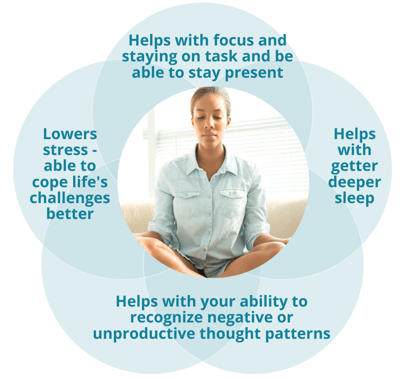 When stuck in the flight/flight/freeze response, also known as the stress response, the brain has certain patterns. It is associated with greater inflammation and lower oxygen flow to the brain. Over time, these brains, because the more primitive limbic brain, which is in charge of the stress response, is habitually active, the prefrontal cortex, which is associated with our 'higher' selves, shrinks.
When stuck in the flight/flight/freeze response, also known as the stress response, the brain has certain patterns. It is associated with greater inflammation and lower oxygen flow to the brain. Over time, these brains, because the more primitive limbic brain, which is in charge of the stress response, is habitually active, the prefrontal cortex, which is associated with our 'higher' selves, shrinks.
The prefrontal cortex is in charge of impulse control, planning, emotional regulation, and focusing our attention to name a few. This then in turn affects that person’s ability to control their emotional response. As a result, that person will lack the ability to pick up on emotional cues in others which then reduces their ability to have empathy for other people.
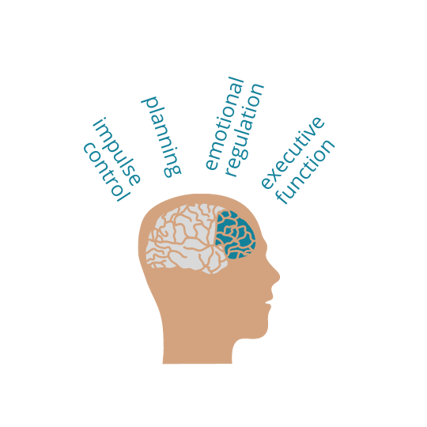 Luckily the brain can reset and re-regulate out of the stress response and into regulation. One evidence-based practice to lower stress is mindfulness meditation. Mindfulness meditation has been practiced in the East for becoming fully present for over 2600 years. In recent decades the practices have been researched by western medicine as tools for lowering stress and creating calm and focus.
Luckily the brain can reset and re-regulate out of the stress response and into regulation. One evidence-based practice to lower stress is mindfulness meditation. Mindfulness meditation has been practiced in the East for becoming fully present for over 2600 years. In recent decades the practices have been researched by western medicine as tools for lowering stress and creating calm and focus.
As Intention and Your Brain: The Science of Meditation suggests, meditation is a powerful cognitive health support because it activates the left hemisphere of the brain. The left hemisphere is responsible for controlling speech, comprehension and writing. These changes were studied through using EEG brainwave tracking and fMRI imaging to see the brain regions activated through meditation.
 NeurOptimal® neurofeedback works by giving feedback in real time about the brain's maladaptive brainwaves. It does so by tracking the brain’s millisecond-by-millisecond electrical activity through sensors attached to the sides of the head. These sensors are only for receiving data from the brain, no electrical currency returns to the brain from the device. This technology, unlike other devices that provide a return electrical impulse to the brain, is non-invasive. Its ability to track and give precise feedback through auditory cues allowing the individual's brain to register what is maladaptive habits, such as the fight/flight/freeze reaction of the stress response.
NeurOptimal® neurofeedback works by giving feedback in real time about the brain's maladaptive brainwaves. It does so by tracking the brain’s millisecond-by-millisecond electrical activity through sensors attached to the sides of the head. These sensors are only for receiving data from the brain, no electrical currency returns to the brain from the device. This technology, unlike other devices that provide a return electrical impulse to the brain, is non-invasive. Its ability to track and give precise feedback through auditory cues allowing the individual's brain to register what is maladaptive habits, such as the fight/flight/freeze reaction of the stress response.
This design provides the key feedback needed for the brain to improve its health and create resiliency. When we are cued to pay attention at the moment change is happening we can, as the brain is designed, optimize our performance. Habitual patterns need to be interrupted in order for change to occur.
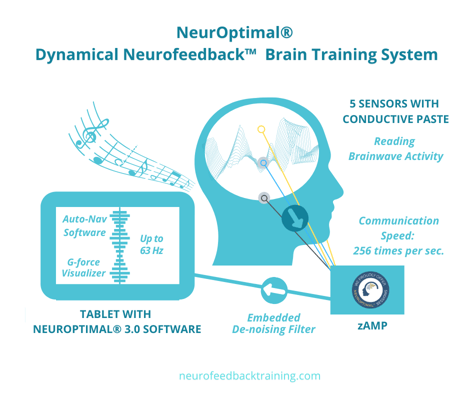 More technically, NeurOptimal® is designed to give feedback at the precise moment based on the mathematical calculations of the brainwaves electrical intensity, the duration of that signal and how frequently it occurs. The software reads 256 data points of electrical output from the scalp per second! That is the speed of the brain's communication. When the software detects change it alerts through interruptions in auditory input, ie music. Those interruptions serve as cues that we need to pay attention to what's happening habitually. Through the process we can shift out of habits such as lacking focus, worrying, disrupted sleep, and reset our mental and emotional patterns.
More technically, NeurOptimal® is designed to give feedback at the precise moment based on the mathematical calculations of the brainwaves electrical intensity, the duration of that signal and how frequently it occurs. The software reads 256 data points of electrical output from the scalp per second! That is the speed of the brain's communication. When the software detects change it alerts through interruptions in auditory input, ie music. Those interruptions serve as cues that we need to pay attention to what's happening habitually. Through the process we can shift out of habits such as lacking focus, worrying, disrupted sleep, and reset our mental and emotional patterns.
The theory is: with good, exact information about its choices, the brain can change itself and optimize performance.
A mind that is more flexible adapts and responds quicker and more appropriately to changes in your environment. The most common results seen from brain training with neurofeedback is better focus, greater mood regulation and calm, better sleep and a greater confidence in ones ability to handle the challenges that life inevitably creates.
How does neurofeedback work? NeurOptimal® Explained
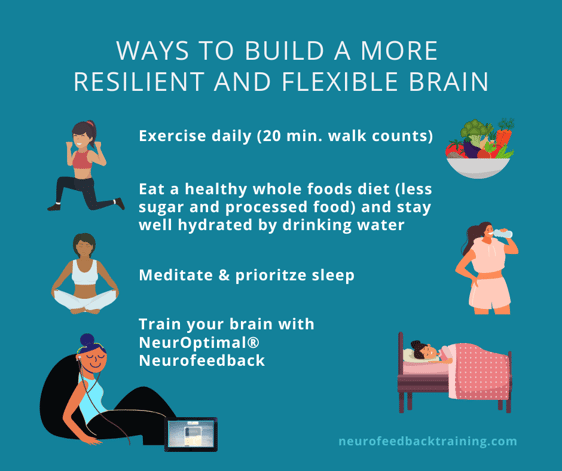
Maintaining proper brain health involves a mix of psychological, physical and mental training applied consistently over months if not years, for maximum benefit. As a reminder, the following are brain health tips that are key to maintaining a healthy and resilient brain:
Whichever of these tips that best suits you apply them with a consistent pattern. Consistency is key to applying these brain health tips to create and see positive changes to your overall health.
Natalie Baker has over 25 years of experience as a licensed psychotherapist and has been a NeurOptimal® neurofeedback trainer since 2011. She is the founder of Neurofeedback Training Co., which offers in-person sessions and runs the largest nationwide home rental program for NeurOptimal systems. Natalie also teaches meditation and Buddhist psychology and specializes in working with anxiety, stress, ADHD, and trauma.
Unlock your brain's potential and boost cognitive function the natural way. From brain exercises to foods, learn 4 easy ways to improve your brain...
What impacts brain health and performance? More than you think! Learn what factors impact brain performance from genetics to the food you eat.
You are what you eat. What are brain foods that hinder brain performance? You'll be surprised to learn all the foods that are out and which ones...
Be the first to know about new blogs